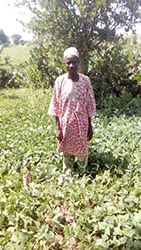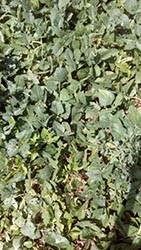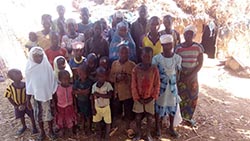Theresa Ampadu Boakye, our M&E specialist, selected this article (Podcaster 46, June 2017) because it indicates that projects can do random implementation and still have adoption; meaning, guided selection of project beneficiaries (e.g. selecting beneficiaries who grew legumes only to have participated in N2Africa) will always leave out enthusiastic ones like Malam who would have adopted but would not have had the chance had it not been the project’s approach to expand to non-cowpea areas. There should always be room to include such.
It started some time ago in 2012 when the N2Africa project Nigeria extended its dissemination activities to Niger State located in the North Central Zone of Nigeria. There, the campaign was further devolved to Shiroro Local Government Area (LGA) where Malam Isah Wakili lives with his family, in a community called Gwagwa which is largely dominated by the Gwari tribe. N2Africa activities were launched in this area to introduce legumes in a farming system that is dominated by tuber crops and cereals. During this launch, Malam indicated his interest to participate. He was trained as a lead farmer by the project because of his good knowledge and experience in farming and his ability to organize and lead other farmers. This story highlights Malam Isah Wakili’s achievements as a lead farmer and commercial seed grower through his involvement with the N2Africa project.
|
Malam Isah received an N2Africa package with cowpea seed to demonstrate on a variety trial on his farm in Shiroro as outlined in the N2Africa agronomy protocol. The objective was to test whether cowpea production would succeed in a humid climate, and to try a crop and soil improvement programme based on a rotation of cowpea and cereals. Malam Isah was guided by the extension agent named Mr. Tanko Mairogo to establish a trial with promising cowpea varieties (including IT99K 573-1-1 and IT90K 277) and he committed himself to tendering the field. The crops performed great and resulted in good yields, and this attracted neighbours and other farmers in the area. Indeed Malam Isah was impressed and he guarded his field devotedly.
|

fields located at Gwagwa in Shiroro LGA of Niger State |

reproductive growth stage |

who are often nourished by legume recipes Having seen the good performance of the crop in his field and given that cowpea is a rare crop in the area, Malam Isah decided to preserve the seeds with the intention of continuously multiplying these varieties on his own without any further direct involvement and supervision by the project. Occasionally, the extension agent still gave some training to address that cowpea is vulnerable to pests and diseases, especially in a humid climate. Armed with knowledge about the best possible management options, Malam Isah did not hesitate to apply the appropriate agro-chemicals. The produce from these efforts was usually sold to other farmers who now showed interest in cultivating cowpea and other legumes. In view of this novel idea, he has found a niche for himself as a local agrodealer in cowpea seeds. Malam Isah has a good income from these activities. He has become a dependable agro-dealer in cowpea seeds that other farmers could easily access. In a good season, he could harvest up to 2 ton ha-1 from his farm from which a part is sold to people, a part is preserved for the next season and a part is used for domestic consumption and processed into local dishes. As such, the introduction of cowpea has brought diversification to a monotonous farming system, cowpea production was adapted to the local farming system through pesticides and crop rotation, and Malam Isah became established as a key figure in the community by linking farmers to the state ADP and seed companies. Malam Isah’s approach to legume production moved from demonstration to a more effective and result-oriented adoption. He did so with inspiring determination, capped with entrepreneurial ability. This all has connected him strongly to the project, in the context of one of N2Africa’s principal objectives of enhancing commercialization and sustainable agro-input supply. Malam Isah stands out among the resource-poor smallholder farmers and he is willing to learn, adapt and practice new things and thereby adding value to agriculture even in a rural setting, not minding the daunting challenges farmers face including a low resource base, use of low-yielding crop cultivars, adverse weather events caused by climate change, the menace of exotic pests and diseases and ultimately, low soil fertility. He said that he got to know that legumes, particularly cowpea and soyabean, could thrive in his location, thanks to the N2Africa project. |
Congratulations!
The project is pleased to have Malam Isah Wakili as one of its numerous farmers and indeed wishes that this outstanding effort will be sustained, and also encourages other N2Africa farmers to take a cue from Malam Isah who can make business in agriculture even at communal level and at low-scale production. We will not relent in our dissemination campaigns until we all get there! Carry on Malam Isah and best wishes.
Acknowledgement:
It is with good intention that we recognize and sincerely appreciate the efforts of the MD and staff of Niger State Agricultural Mechanization and Development Authority (NAMDA) along with the resourceful extension agent who discovered Malam Isah Wakili during the first phase of implementation of the project dissemination in Nigeria. Particularly, we thank Dr. Idris Usman Gbogan-Director of Extension Services of NAMDA for the tireless extension services he rendered and effective coordination of N2Africa project activities in Niger State.
Bassey Ukem and N2Africa project Nigeria Team
